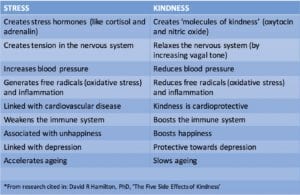
image: iStock Photo
Everybody knows what stress feels like. We also know what it feels like when we’re kind, when someone is kind to us, or even when we witness kindness.
The feelings are opposite. Most of the effects inside the body are the opposite too.
Feelings of stress generate ‘stress hormones’ in the brain and body, like cortisol and adrenalin.
Feelings of kindness generate oxytocin and nitric oxide (I affectionately call them ‘molecules of kindness’). Stress creates tension in the nervous system, pushing it into ‘fight or flight’; Kindness relaxes the nervous system, guiding it into ‘rest and relax’.
Stress increases blood pressure, kindness reduces it.
Feelings of stress generate free radicals and inflammation in the arteries and immune system, which can eventually lead to cardiovascular disease. Feelings of kindness reduce free radicals in the arteries and immune system. Kindness is, in fact, ‘cardioprotective’ (protects the cardiovascular system).
Stress weakens the immune system, kindness boosts it.
Stress makes us unhappy; kindness makes us happy.
Stress is linked with depression; kindness is protective towards depression.
And just to top it off, while stress speeds up ageing, kindness slows ageing.
The Science
Here’s a little by way of a simple explanation for some of the above effects.
Stress is linked with cardiovascular disease. Small amounts of stress are OK and even relatively large amounts too, if not too frequent, but consistent stress is associated with poor health outcomes through having a negative impact on the heart, arteries, and immune system. Stress is ultimately associated with shortened lifespan.
On the other hand, the warm feelings we get through kindness generate oxytocin and nitric oxide. Nitric oxide softens the walls of our arteries and improves blood flow around the body. Together, oxytocin and nitric oxide reduce blood pressure.
Where stress increases free radicals (oxidative stress) and inflammation in the arteries and immune system, which is linked with hardening of the arteries, research on oxytocin using cells from the arteries and immune system found that it reduced free radicals and inflammation in the arteries and immune system, effectively acting as an efficient antioxidant and anti-inflammatory.
Research also shows that in relationships where there is more kindness, love and affection, there is also much less hardening of the arteries. It’s almost as if when we harden towards others, so we harden in the inside, but when we soften towards others, so we soften on the inside too. I love the symmetry!
Stress increases activity of the sympathetic nervous system, placing the body on alert. Kindness and compassion, on the other hand, increase parasympathetic activity, allowing the body to relax and regenerate. Kindness and compassion increase vagal tone, which is a measure of parasympathetic activity.
Stress can have a long-term negative effect on the immune system. Kindness, on the other hand, explains the ‘Mother Theresa Effect’; this is from research that showed that the immune systems of volunteers were boosted when they watched a video of Mother Theresa of Calcutta performing acts of kindness.
Kindness also makes us happier and is an antidote to depression. Many pieces of research comparing people performing acts of kindness with people going about their normal business show that people doing kindnesses become happier. Other studies find that, statistically, people who do regular volunteer work are generally happier and suffer less depression than people who don’t.
What surprises many people is that kindness slows ageing. It’s pretty obvious, really, when you really think about it. It is common knowledge that stress speeds up ageing. We’re all familiar with the tales of people whose hair went white rapidly once they began a stressful job. Stress causes oxidative stress (what happens when free radicals wreak havoc) and inflammation, which accelerate ageing of the heart and arteries, immune system, joints, muscles, hair, skin, brain … pretty much the whole body.
Kindness slows ageing in a few ways. Indirectly, simply through sparing ourselves stress we spare ourselves some of these effects. But more directly, the products of kindness (oxytocin, nitric oxide, and increased vagal tone), actively slow internal processes of ageing, like oxidative stress in the skin, muscles, arteries, immune system. Some research, for example, has shown a substantial reduction in oxidative stress in muscles and skin when there’s plenty of oxytocin around.
And here’s the thing: you can’t get oxytocin from diet. You can’t eat it nor drink it. The only way to get it is to make it internally, and we make it through how we think, feel and behave. When our thinking, our feelings, and our behaviour towards others and towards animals is kind (yes!… kindness to animals boosts oxytocin) then it’s like we turn on an oxytocin tap inside our bodies, giving us much of these ‘side effects’.
You don’t need to do something huge for it to qualify as a kind act. Simple gestures count too. Even a kind thought about someone that results in a smile on your own face is you being kind.
You don’t even need to give it much thought at all.
Just be kind!
By David R Hamilton, PhD
Author of ‘The Five Side Effects of Kindness’
References: Research quoted above cited in ‘The Five Side Effects of Kindness’
The table below summarises the effects of stress vs kindness


If we practice Meditation and Mindfulness and any of the wellness traditions and Kindness then it must follow as the night, the day that we must enhance the benefits even more. The body is truly a wonderful machine.
Thank you very helpful
This was such a lovely summary from a fantastic book I recently read by Dr. Lissa called Mind Over Medicine!
I shall bookmark this article to share with all my clients.
Love & Light,
Aakansha
Healer. Health Coach. Life Coach. Happiness Advocate. Passionate Blogger.
Though i have learned about it but after read your articles, i just realized the amount of knowledge that i missed. Thank for your shared.
[…] https://drdavidhamilton.com/the-opposite-of-stress/ […]